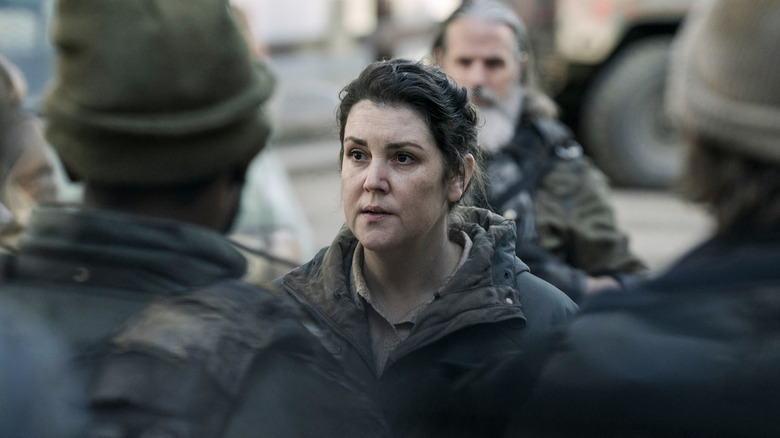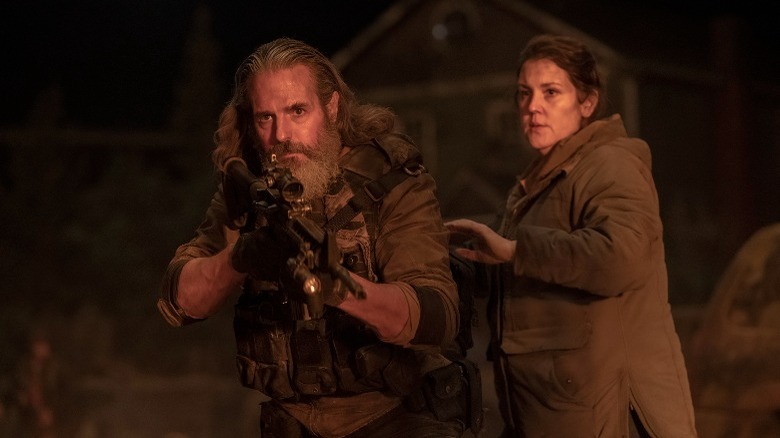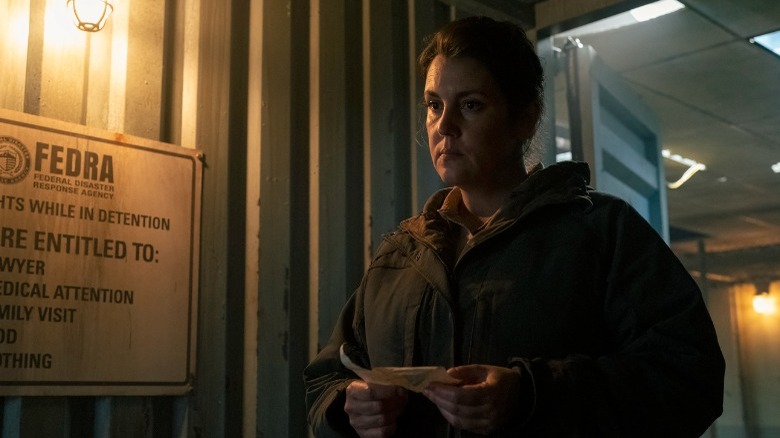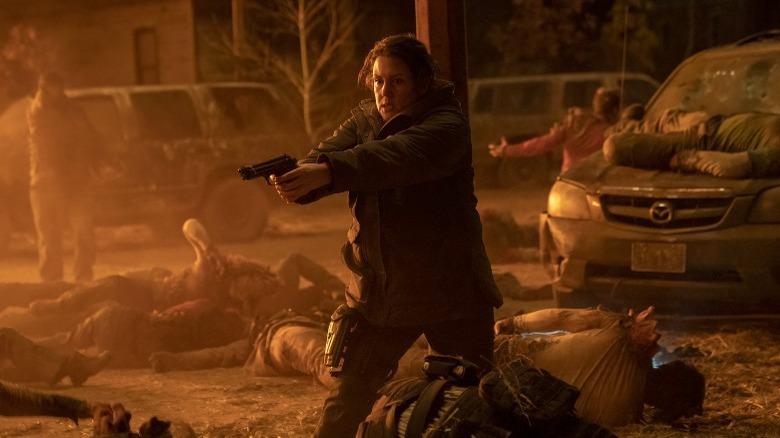Melanie Lynskey Is Delightfully Villainous As Kathleen In The Last Of Us
This post contains spoilers for "The Last of Us" episode 5.
When Melanie Lynskey's Kathleen meets with a group of imprisoned FEDRA "collaborators" in the new episode of "The Last of Us," she calls to mind a schoolteacher. She neatly unfolds a metal chair and takes a seat in front of the group. They're on the ground, huddled in fear, but from the right angle they look like they could be listening to story time. Her language when she speaks to them, simple yet patronizing, reinforces the idea. "Did it feel good?" she asks the group, describing the way they sold out their neighbors for the barest of rewards. "Did it make you feel safe? How does it make you feel now?"
Indeed, that was how the character was envisioned by "The Last of Us" creator Craig Mazin. Speaking on the latest episode of the official podcast, Mazin described the basic character concept for Kathleen as: "What if a kindergarten teacher were in charge of the terror of the French Revolution?"
Kathleen isn't a teacher, though: she's a ruthless, hyper-competent leader who doesn't flinch when she puts a bullet in the head of her old family doctor. The character is an original creation for HBO's "The Last of Us" adaptation, and a good one, in large part thanks to her casting. Lynskey is a much-loved actress, and while she's played complex killers before in projects like "Yellowjackets" and "Heavenly Creatures," she nearly always projects a level of warmth that makes her impossible to fully root against.
A confident, competent villain
Lynskey's natural warmth is a quality that works to her benefit in "The Last of Us," as she gives off the air of someone who may have been really nice an apocalypse ago. Now, though, she's fed up, and savvy enough to do something about it. When she speaks to her second-in-command, Perry (Jeffrey Pierce), it's with the sort of confident, calm derision that leaves a person too scared to snap back. "He's not my seventh priority, Perry," she says when he suggests a roundabout plan to track down the boy she blames for the death of her brother. Later, she meets his update on the hunt with an oddly endearing understatement: "We're not doin' so good." Kathleen is the definition of no-nonsense.
Ahead of this week's episode of the show, Lynskey shared some of her insights into the character on Twitter, in a thread that acknowledged criticism that she is, as she says, "not the typical casting for this role":
"I was excited at the idea of playing a woman who had, in a desperate and tragic time, jumped into a role she had never planned on having and nobody else had planned on her having, and then she actually got s**t done."
The actress wrote that she found the role exciting because her casting "suggested the possibility of a future in which people start listening to the person with the best ideas." As she points out, women in leadership positions come under fire for every aspect of their being, from the tone and volume of their voices to the way they convey their emotions to the level of effort they put into their appearance. "I wanted her to be feminine, and soft-voiced, and all the things that we've been told are 'weak,'" Lynskey wrote.
Kathleen is the type of survivor we rarely get to see
It's a fantastic subversion, and one the actress pulls off with total control over her screen presence — including that vocal softness she mentions. You'd think in a world that's filled with mushroom zombies, internalized misogyny wouldn't be a pressing issue, but it's worth noting that when we see stories about post-apocalyptic survivors, they pretty much never look and sound like the person Lynskey describes. There are plenty of Joels out there in this sub-genre — stoic, physically strong men with clenched jaws and steady trigger fingers — but very few Kathleens. It's not lost on me that Kathleen isn't given a deeply emotional or unique backstory to drive her over-reactive vengeance against Henry (Lamar Johnson) and the FEDRA collaborators whose execution she orders. It's simple: she had a brother, and she loved him, and she couldn't keep him safe. "He was so beautiful," she says. "I'm not, I never was."
We don't meet Kathleen's brother, because we don't need to. What matters is that he was the person in her life worth living and dying and killing for. As game creator and series co-creator Neil Druckmann put it in the official "The Last of Us" podcast: "love conquers all, and that might not be a good thing." We've seen this before in "The Last of Us," and we'll see it again, but while many other characters are defined by their indecision or flickers of empathy, Kathleen is a person of action through and through. She's not more right in her actions than any other character, and is certainly more wrong than many, but Lynskey makes her flaws incredibly interesting.
Long live the expectation-defying female villain
We aren't given a particularly in-depth backstory for Kathleen, but the series also subverts our expectations by refusing to "punish" her in the way so many writers clearly relish hurting their female villains. She dies pretty much randomly, with a demise that doesn't particularly feel like a karmic correction. "What is the point of that?" Kathleen asks Perry when describing her brother's plea for her to show forgiveness.
The same question could be asked of Henry's ineffective superhero armor, or of Brian's death at Joel and Ellie's hands, or of her own quest for vengeance, cut short in the end by an infected little girl who doesn't even give Kathleen the chance to share any last words. "The Last of Us" imagines a world that's almost endlessly dark, and it's thrilling to see it find a place — even temporarily — for someone as assured, strategic, and surely-underestimated as Kathleen.
Lynskey manages to imbue the character with steely resolve, decisive wrath, and a glimmer of empathy even with her limited screen time. Kathleen may be dead, but she made a strong impression: long live complicated, competent, expectation-defying female villains.



